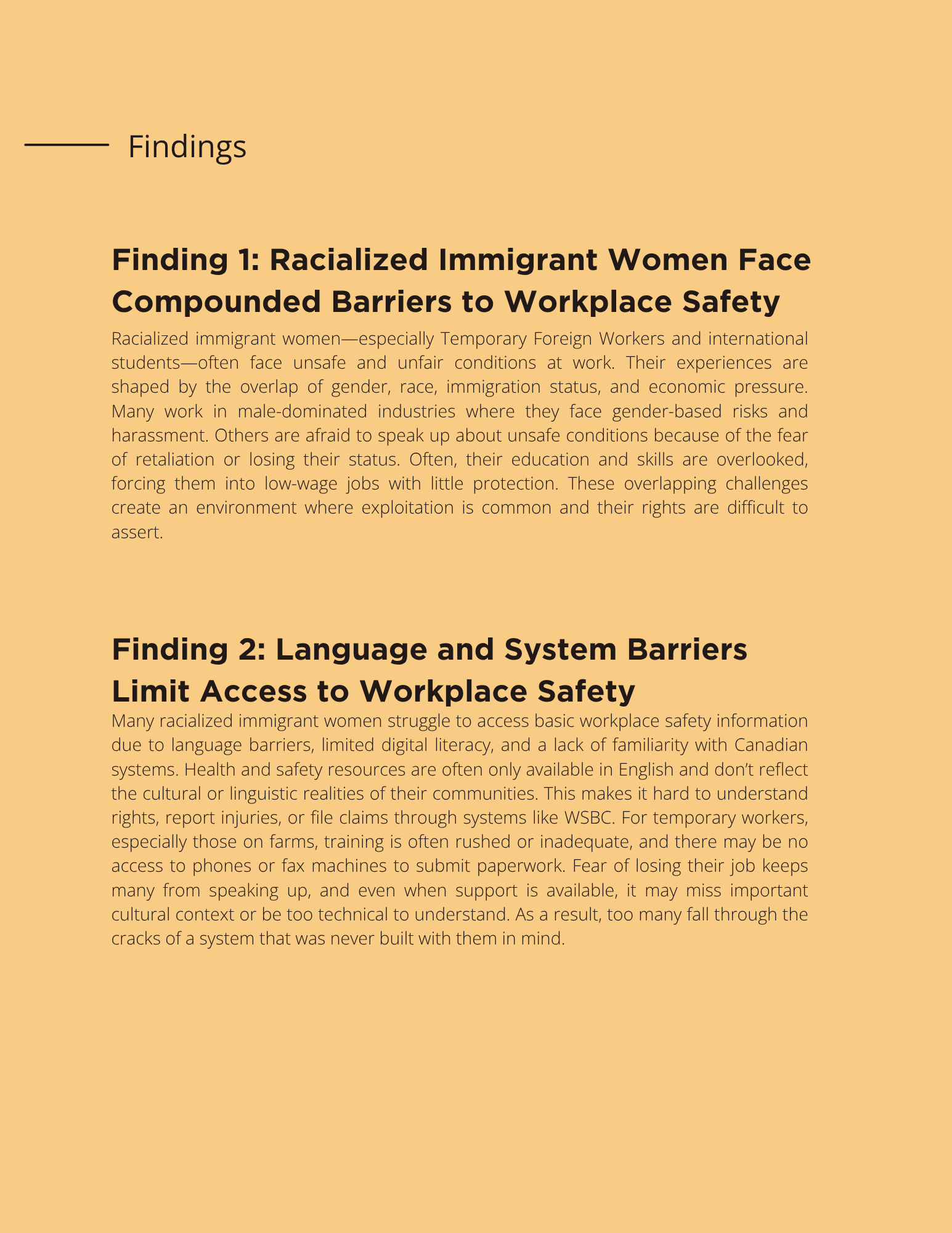
Safer Workplaces
Racialized Immigrant Women’s Experiences of Workplace Health and Safety
Racialized immigrant women in British Columbia often face significant barriers to fair employment, despite being educated and skilled. Many are pushed into low-wage, precarious jobs where they experience discrimination, unsafe working conditions, and limited awareness of their legal rights. A lack of trust in the legal system, language and cultural barriers, and precarious immigration status further prevent them from seeking help or asserting their rights in the workplace. These challenges—compounded by deskilling and systemic racism—leave many women vulnerable to exploitation and harm.
The Safer Workplaces project builds on our earlier phase, Short-Changed, by deepening the investigation into workplace health and safety issues experienced by racialized immigrant women. In 2024 and 2025, we worked with a group of 12 women, as well as service providers, legal aid organizations and union representatives, to explore barriers to accessing employment rights and protections—especially through WorkSafeBC. Through education, dialogue, and community engagement, the project aimed to raise public and policymaker awareness, empower women with legal knowledge, and recommend solutions for creating safer, more inclusive workplaces.
-
The Safer Workplaces project (2024–2025) focused on understanding and addressing the workplace challenges faced by racialized immigrant women in BC. Central to the project was the formation of a Support Group with Lived Experience Experts—12 women from diverse backgrounds who came together over eight months. These participants shared personal stories, learned about their legal rights, and built a strong sense of community. The support group sessions included legal education workshops, storytelling activities, and group reflections, creating space for learning, healing, and empowerment. Participants also contributed creative work—written stories and visual art—to raise awareness about their experiences and challenges in the workplace.
The project also included Key Informant Interviews with professionals such as legal advocates, community workers, and union representatives who work closely with racialized and immigrant communities. These interviews provided insights into broader systemic issues, especially the barriers women face in accessing legal protections and reporting health and safety concerns.
In addition to direct research, the project emphasized Creating a Network of Allies and Knowledge Sharing through Multimedia Art, Reports, and Events. We reached out to immigrant-serving organizations, legal clinics, and grassroots groups to strengthen partnerships and share findings. As part of knowledge mobilization, participants collaborated with a multimedia artist to create visual representations of their stories. These were shared through a community event, a social media campaign, and a series of short videos and reports aimed at engaging both community members and decision-makers. This multi-platform approach allowed us to amplify the voices of racialized immigrant women and push for more equitable and safer work environments.
-
View report here
-
Pacific Immigrant Resource Society
South Asian Legal Clinic of BC
Solid State Community Industries
-
The Law Foundation of BC
-
This part of the project brings together the voices and visions of eleven racialized immigrant women navigating the Canadian labour market. Developed between 2024 and 2025, the project emerged through a series of storytelling workshops led by Shanga Karim —an immigrant, journalist, and human rights activist. Participants reflected on their lived experiences and shared personal stories of work, struggle, and survival.
Visual artist, human rights photographer, and curator Natalia Botero interpreted these powerful stories through photography. Later, in collaboration with graphic designer Alejandra Villanueva, they brought the narratives to life through multimedia content and authentic visual storytelling. Together, these works highlight both the vulnerability and the resilience of the storytellers.
Many participants shared how difficult it is to recognize abuse or rights violations in the workplace, especially when facing language barriers, immigration precarity, or lack of information. Yet, the stories also speak to these women’s strength, creativity, and determination to support their families and rebuild their lives.
The artworks produced are not only personal testimonies—they are calls to action. They reveal the urgent need for trauma-informed, culturally safe, and accessible systems of support. They ask us to listen, reflect, and advocate for justice in the workplace and beyond.
To respect participants’ privacy, some names and identifying details have been changed at their request. The full collection of stories is available on our website.
Storytelling for Change







